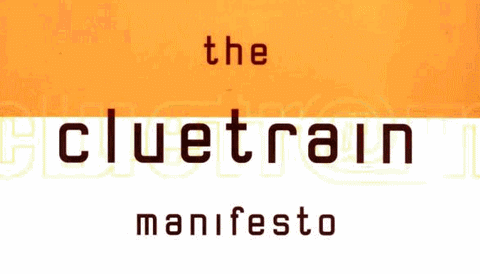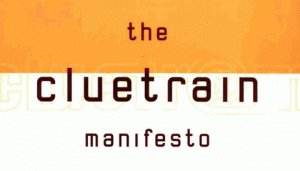Older generations have companies in a deathgrip. Because they don’t get what’s changed.
A couple of posts ago I wrote about the fact that I am going to talk back to some of the theses of the Cluetrain Manifesto. I’m not going to do this in any sort of structured way, because that isn’t the point. You are just going to have to pick it up with me and try to keep up.
Today, in talking to a recruiter about possible career change, and in looking for work, I was told rather directly:
Finding work for you will be hard, because of your diversity.
Correct. I am indicative of a go-getter of my generation. I’ve been in hundreds of jobs, all different. I’ve run my own businesses. I’ve run major international projects. There’s a bit of a path through it but it takes lateral thought. Try taking that to someone in HR and asking them to tick boxes. This woman I talked to today looked at my resume, baffled. Her eyes were wide, her hands were up in the air. She was scanning my employment history like mad, trying to fit me into a box. Of course, it didn’t work.
“What do you want to do?” she asked, not understanding that it’s not the job, it’s the culture that drives me. As long as I’m busy. It took my guidance in pointing out common ground in the history to help her connect the dots. Come on, people, it’s not hard.
Or maybe it is hard. These people think about target markets constantly.
Which brings us to marketing. (Right now you’re thinking, “What the hell has this to do with marketing?”, right?) Let me present to you thesis number 86 from the Cluetrain Manifesto.
When we’re not busy being your “target market,” many of us are your people. We’d rather be talking to friends online than watching the clock. That would get your name around better than your entire million dollar web site. But you tell us speaking to the market is Marketing’s job.
Traditionally, marketing is about identifying ‘target markets’, of satisfying those markets, and of retaining customers. More broadly, it’s about selling services and products to a group of people.
Everybody who learns about business management goes through the necessary tedium of identifying markets and niches, of generating strategies for reaching those markets, of finding ways of hooking people in and retaining them. If you’re in a service based or not-for-profit, public sector type agency, your market is very much more defined. But in principle you are doing the same thing.
While you are trying to define your target market, you are likely missing the point. Do you have employees? How do you prefer to spend your time when you’re not matching people to jobs, or selling toasters, or trying to convince people to get a flu shot?
You’re sitting there thinking about everything else you could be doing. You would rather, as the manifesto says to us, talk to friends online. Or get into a conversation on Twitter. Or post interesting links on Facebook. Or spend hours navigating other media like Tumblr, reposting things, creating a networked culture.
So what’s your market doing?
You know, I struggle with traditional notions of marketing and public relations. Ask me to explain my methods and I’ll fall flat on my face, but I can build an audience for a product that doesn’t exist yet, simply by being engaged. What do people in Marketing do? Analyse markets, try to build hooks and advertising to hit that market. Why don’t they just talk to people?
I’m one of those early adopters of new technologies. I’ve been there, done that on Facebook, and I’m out of it now. Twitter is great, but I’m sure there will be something else not long down the track. And I can tell you, if you are in marketing, why aren’t you just in conversation? If you own or run a business or organisation, are you connected to your ‘market’? Is your door (physical or virtual) open? Do you encourage your employees to bare themselves online and chat about shit?
I doubt it. In fact, I bet you have policies against social networks and internet use in your workplace. I bet the wrath of god himself comes down on employees who engage in “inappropriate” use of technology. Well, pull your head out of your arse.
If you want your name to get around, let your employees engage. Encourage them to talk about the company, its staff, its goings on, its products, online. Draw the line at confidential stuff, obviously, don’t make me labour the point. But everything else? Fair game, baby.
If recruiters and if HR processes were more relaxed – that is, if people stopped putting other people into boxes, and started going with the flow to match people to roles, and not titles to titles – I’d have a kick-arse job right now, in a team that values me. Instead, I’m hitting brick walls, just like consumers in Australia are hitting brick walls with companies. This is why the clock is ticking on vast numbers of businesses here and around the world.
I’ll leave you with that thought. Until the next manifesto talk-back… which will tie in. Promise. Drop me a comment and let me know your thoughts.



@Jo: Thank you for the kind comment!
@Alan: Yes. And actually you remind me that one of the proprietors of an indie press in Adelaide runs his press (and hence his authors) like he does his band(s). That is: get out, be visible, be available, play “gigs”, get engaged. Authors tend to shy away from that sort of highly visible engagement, but it is mega effective.
Excellent post and couldn’t agree more. I know I sell more books due to people talking about them and leaving reviews on Amazon and Goodreads, etc., than I ever sell due to my own or my publisher’s marketing efforts. We live in a world of conversation these days and that’s how people engage with each other and products of every description.
couldn’t agree more, you have totally nailed it .. people need to stop selling and start engaging. A very easy read, thankyou for sharing-:)